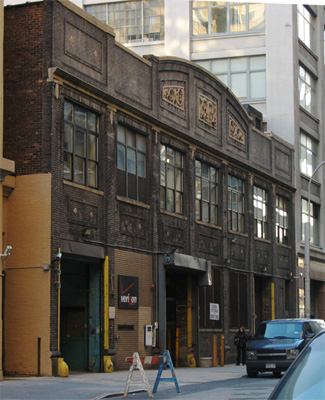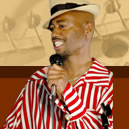Let the Music Play: Remembering The Paradise Garage
by Craig Washington
“Disco, that’s where the happy people go.” - from The Tramps That’s Where the Happy People Go (1976)
 The Paradise Garage was one of the most influential discotheques of its era as it had an immeasurable impact on dance music, the offspring clubs it inspired, the renowned djs it schooled, the throngs who spent thousands of hours on its floor, and subsequent generations who have only heard about it and strive to resurrect its spirit. The Paradise Garage was one of the most influential discotheques of its era as it had an immeasurable impact on dance music, the offspring clubs it inspired, the renowned djs it schooled, the throngs who spent thousands of hours on its floor, and subsequent generations who have only heard about it and strive to resurrect its spirit.
The dance culture that flourished in metropolises like New York, San Francisco and Los Angeles, in the seventies and eighties was not exclusively gay, in fact many heterosexuals participated in the scene as both patrons and managers. But the idioms and highly erotic ambiance that distinguished that culture and largely defined the era in which it arose were largely shaped by gay men who had just begun embracing their own burgeoning sexual renaissance. The norms of delirious self expression, vibrant fashion, fluid sexuality and gender, and pounding r&b and salsa based music, was driven by a convergence of queer, Black and Latino sensibilities.
There are several factors that established the Garage above its competition as the apex of dance culture in New York, the undisputed capitol of disco. Its concept was heavily drawn from its most prominent forerunner, David Mancuso’s Loft which did not sell liquor, was not open to the general public and welcomed queer guests. It was a renovated parking garage at 84 King St in the West Village that opened in 1977 at the beginning of the genre’s peak. It featured a cavernous sanctum that could only be entered through the lot’s original ramp whose edges were lined with floor lights. It quickly became the uncontested favorite among those who were Black, latino and/or queer because it featured the hottest dance tracks catering to their tastes, the transformative brilliance of its resident dj, Larry Levan, the best sound system in the city, and the sublime dance rituals performed by its congregants. It was this alchemic mixture of the music, the system, the building, the shaman/dj, and the celebrants that conjured a hallucinogenic vortex through which many entered and were entered by the “spirit in the dark”.
No doubt that some of these transcendental experiences that “Garageheads” recall were enhanced by the drugs du jour, poppers, mescaline, acid, and perhaps the additives rumored to have spiked up the bottomless punch bowls. But drug use was commonplace among the disco set and no amount of drugs would have distinguished this club from its competition. It was simply the best dancerie, in the best city, at the best time to “keep on dancin”, the silver age of disco.
Perhaps more than any single individual, Larry was the architect of the Garage experience by way of his highly trained yet intuitive spinning abilities. He titillated and mesmerized the crowd with those songs, most of which were spirited paeans of love and desire, like a lover whose ultimate pleasure came from pleasing his partner. From midnight to midmorning, his flock was stroked in cycles of sweet, sweat dripping joy, flailing orgasmic peaks, cooling trances and back. Larry’s gift was his prescience, an uncanny intuition matched with his superlative mastery of rhythm, pacing, and overall selection. He was as much a performer as any of the those whose music he played. As much as anyone who ever spun a record, Levan elevated the deejay to the stature of a true artist.
The night I fell in love with the Garage, my friend Derek and I (both Chaka Khan fans) danced to her stormy club classic “Clouds” for the first of many times to come. It was the spring of 1980. As the chorus rang “gonna rain. rain down tears, heartaches and fears” we were buffeted by air blasts from the A/C and plastic pellets of rain from the ceiling. On its closing night in the early fall of 1987, Larry Levan kissed teary eyed fans goodbye with favorites like Sister Sledge’s “We Are Family” , Diana and the Supremes “Someday We’ll Be Together” and Two Tons of Fun “Just Us”. Their lease was up in October, owner Michael Brody was dying from AIDS and he decided rather than relocate, he would let the club, his legacy die with him.
In 1981, the epidemic broke shore while the Garage was riding its short lived crest of success. Unbeknownst to many, the Garage was at one of the pioneer institutions enlisted in the provision of support for AIDS services and education. The Garage was one of the first clubs to host and AIDS fundraiser to support the fledgling Gay Mens Health Crisis. In fact, Mel Cheren, Brody’s longtime partner and the Garage’s primary financier, donated rooms in his Chelsea brownstone, a renovated SRO, to GMHC, ensuring the struggling agency its first home. The Garage also served as a unofficial haven for many of the afflicted, those who came to the floor as if it were an altar, to receive its potent balm of dance, music and, most importantly communion. Throughout the early years of the holocaust, many us on that floor were counting out our days, or searching for telltale signs, Ajust us@ dancing to fight back oblivion.
If you have been kissed by the stars, then you have experienced a pinnacle, a highlighted “time of your life” marked by the excitement and self discovery it yielded. It is often a fateful convergence of our locale, our stage in life, the surrounding social climate, the point in time, and of course the people in our lives at that time in that place, our companions that now serve as the lead characters in our memories. Often this brief journey is anchored by a principal setting, a school or a first love’s apartment. For scores of star kissed children who loved the dance, the Garage was that site.
When the name is evoked, we close our eyes and retrieve those memories, some vague and yellowed and others striking in their enduring detail. The Garage has left hundreds of patrons with a collective bank of precious memories that prompt sudden laughter, fresh insights, sadness and longing. In its 22 year wake, the melody still lingers on in house music or “garage parties” across the country. For a sample of Larry Levan’s classic menu and more, Atlantans can checkout DJ Ron Pullman’s parties every 3rd Saturday at Mixx Atlanta in Ansley Square on Piedmont off Monroe Drive! To learn more about the Paradise Garage, read “Keep On Dancin’: My Life and the Paradise Garage” by the late Mel Cheren published by 24 Hours for Life.
back to top
|









